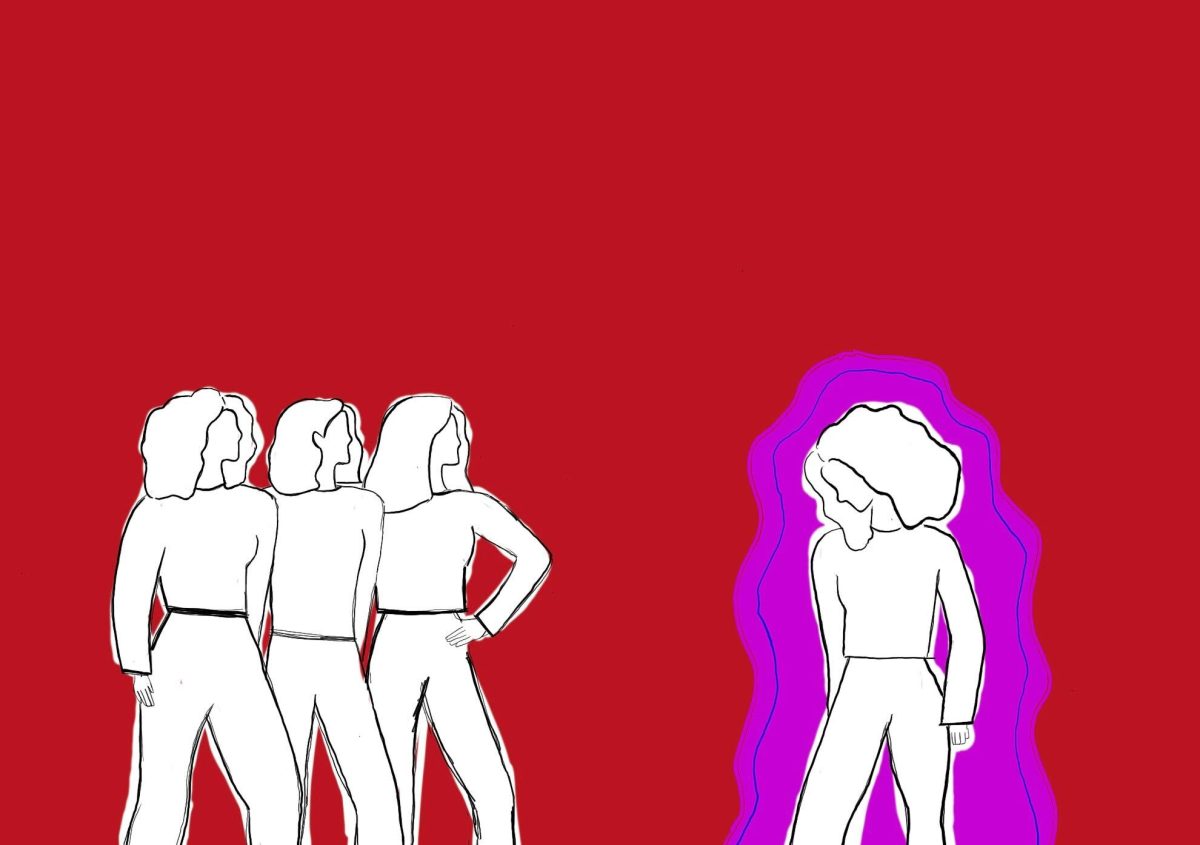Angelina Rifai and her two friends were trying on outfits before a night out. When the first-year biochemistry and bioengineering combined major showed the other women one option, one of them insisted she change because the clothing made her look “fat” and told Rifai, “If you think you’re fat, just lose weight.”
“We were trying to get ready for a frat party, and they knew about my body image issues [and] how I grew up with body dysmorphia,” Rifai said.
Despite her misgivings, Rifai and her friends went to the party. The night ran smoothly until Rifai realized around 3 a.m. that her two friends had left without her.
The following week, Rifai noticed her friends had been going to the dining hall without her after she saw social media posts of them eating together while she was at work. She later learned they deliberately planned ahead to eat when she wouldn’t be available.
“I’ve always been there for them when they were bawling their eyes out. … So what went through my mind is ‘What did I do wrong? What could I have done differently? Why is this happening?’” Rifai said.
Rifai is one of many college-aged students who have dealt with a toxic friend group. Between the stresses of living and learning away from home, students search for a sense of belonging in their new environment, often ultimately causing many to depend on a friend group.
“[In college], you are away from your family, you’re away from the friends that you likely have grown up with, and so you are almost creating a new kind of family or support system in college,” said Mollie Candib, a therapist from New York City who specializes in anxiety, life transitions and depression. “You need to be able to find people that you trust and you can rely on, where there’s also equal effort on both sides. I think all of those things are green flags, things to look out for and friendships, whether it’s in college or elsewhere.”
In the fast-paced college social environment, groups quickly expand and disperse. As a result, many end up excluded from groups of people that they thought were their friends.
“When you’re in a group of friends, you have expectations that they’re going to be like you,” said Suzanne Degges-White, a professor and chair of counseling and counselor education at Northern Illinois University, who co-authored the 2015 book “Toxic Friendships: Knowing the Rules and Dealing with the Friends Who Break Them.”
Degges-White explained that groups tend to connect over a shared interest, belief or opinion, which can originate anywhere from culture, politics or an activity they all participate in, which becomes an unspoken agreement.
“[Your friend group] is going to reflect the activities you enjoy doing,” Degges-White said. “They will affect your ethics, your values, whatever that might be. And so when someone breaks the unspoken rule of the group, they may exclude them.”
Behind the social experience of friend group exclusion, there is a field of science that explains why ostracism — exclusion from a society or a group — is painful. For humans alive thousands of years ago, social exclusion was a tool that groups used to pressure each other into civility and create a sense of alikeness within groups.
“If someone was a burden or deviated, they were kicked out,” said Kip Williams, a distinguished professor of psychology in the Department of Psychological Sciences at Purdue University. “Back then, [ostracism] meant death. Now, it likely doesn’t mean death, but the universal behavior of ostracism still persists.”
Experts said the fear of exclusion can make people more prone to acting out, which could make them act toxic toward the group. It was during his first year at Northeastern when Gabe Taylor, a now fourth-year media and screen studies major, found himself in a similar situation.
In high school, Taylor had a group of close friends and expected to form similar relationships in college. His new friend group didn’t like one person that he was close with, leading to strain within the group.
“You [gossip] long enough that people pick up on it, decide that you’re scummy and they don’t want to hang out with you anymore,” Taylor said.
This behavior is not abnormal for adults, according to experts. Candib said people may carry some undesirable social traits well into their adulthood. But ultimately, she said, friends must communicate about their feelings.
“If a member of your group is doing something wrong or not aligned with your values and beliefs and it’s becoming harmful to the group, that’s also something to be addressed so that the rest of the group isn’t negatively affected by that,” Candib said.
However, communication is often hard for larger friend groups and may be exacerbated by social media, leading to the notorious feeling of fear of missing out, or FOMO. Mars Poper, a third-year criminal justice major, spent their first year abroad and felt overwhelmed when their initial group of friends quickly fell apart during their first semester. Now, reflecting on their first year, Poper shared that they realized they were getting excluded when they saw their group doing things together on social media without them.
“Imagine just laying in bed one day on a weekend and it’s nighttime and I want to do something, but I don’t have anyone to do it with, and then I see on social media, on Snapchat or whatever, I see that these three people are hanging out; they’re outside getting boba or something or outside getting dinner without me,” Poper said.
Williams said feeling excluded from a group threatens four fundamental needs that psychologists have shown are necessary for healthy living: belonging, self-esteem, control over one’s environment and meaningful existence.
“You try to fortify your sense of meaningful existence, which would mean that you would try to make sure that you are on people’s radar, that they see you, that they acknowledge you and that you sort of provoke their attention,” Williams said.
To navigate tense social situations and toxic friendships, taking a step away and finding people to talk it through with are important first steps, said Shari Leid, a public speaker on relationships and adult friendships who is known online as a “friendship expert.”
Instead of feeling forced to make a decision about friendships, Leid suggests that people be open to new social opportunities in moments of pressure from a group.
“Once you join these groups, if it’s not a fit, you can join another group,” Leid said. “But by putting yourself out there, that allows you to meet kids that you normally wouldn’t meet in maybe your dorm or in your classes.”
For situations where you know you’ve recognized you’re in a toxic friend group, Candib suggests that you handle it depending on your comfort level.
“Is it a situation where you kind of just quietly and gently walk away and maybe there doesn’t need to be a conversation?” Candib said. “Other times it’s more helpful, more beneficial for there to be an actual conversation with the group or with the person who is excluding you or treating you poorly.”
But at the end of the day, Candib said there is one thing that is essential for recognizing a healthy friend group.
“It’s important to set boundaries, and with that you want to recognize what isn’t feeling healthy, what would feel healthy and stand firm with that,” Candib said. “As part of that, I always recommend reflecting on the friendship or the relationship. So do these friendships actually align with who you are, what you need and what feels okay for you?”
Mars Poper is a former member of The Huntington News’ photo staff.












